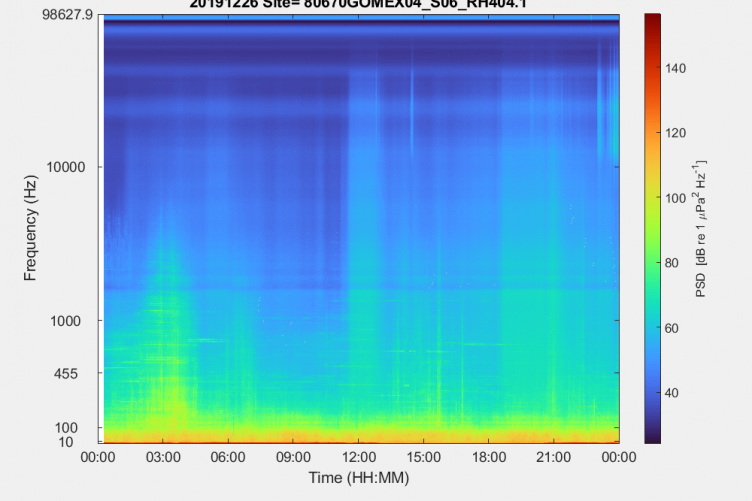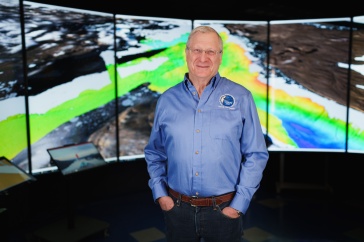
Image of one of the MANTA data products allowing standardized analysis of ocean sounds to better understand the global ocean soundscape.
An international development team led by UNH has created a user-friendly software program that will help researchers understand the global sea soundscape dynamics, including the impact of COVID-19 when travel and economic slowdowns put a halt to human activities in the ocean. The software, called MANTA (Making Ambient Noise Trends Accessible), can process sound data collected from the world’s oceans in a more standardized format that will enhance research and collaboration.
“Soundscape analysis can be important in detecting and interpreting changes in ocean ecosystems,” says Jennifer Miksis-Olds, research professor and director of UNH’s Center for Acoustics Research and Education. “Sound is the dominant sensory mode for marine life and humans for sensing the underwater environment, so understanding how the background ocean sound levels are changing will provide insight into how sensory systems — both biological and electronic — are impacted.”
“Integrating data on animal behavior based on soundscapes can reveal long-term effects of changes in oceans.”
MANTA provides a publicly available tool to process ocean audio recordings in a consistent way to support cross-study comparisons over space and time. It generates four data products per day capturing different aspects of ocean sound. The program will be used as part of a plan by the International Quiet Ocean Experiment (IQOE) to look at the effects of COVID-19 when human activities in the ocean, like shipping, fishing and recreational crafts, essentially stopped, creating a unique opportunity for a time-series study of the impacts of sound on ocean soundscapes and marine life. Researchers around the world will create a global data repository with MANTA products to document vital ocean soundscapes and effects on the distribution and behavior of vocalizing animals.
“Integrating data on animal behavior based on soundscapes can reveal long-term effects of changes in oceans,” said Miksis-Olds. “The challenge with this research has always been that there aren’t any formal standardized methods for collecting, processing and reporting ocean sound levels.”
Marine animals use sound and natural sonar to navigate and communicate across the ocean. Combined with underwater recording tools, like hydrophones, and methods such as animal tagging, the software program will help reveal the extent to which anthropogenic noise affects ocean species and their ecosystems. Sound travels far in the ocean and a hydrophone can pick up low-frequency audio signals from hundreds, even thousands of kilometers away.
Along with UNH, the international software development team included researchers from Cornell University, JASCO Applied Sciences, Loggerhead Instruments and Oregon State University. The Center for Acoustics Research and Education is one of six research centers within UNH’s Institute for the Study of Earth, Oceans, and Space.
MANTA was created through generous support from the Richard Lounsbery Foundation.
-
Written By:
Robbin Ray ’82 | UNH Marketing | robbin.ray@unh.edu | 603-862-4864
















































